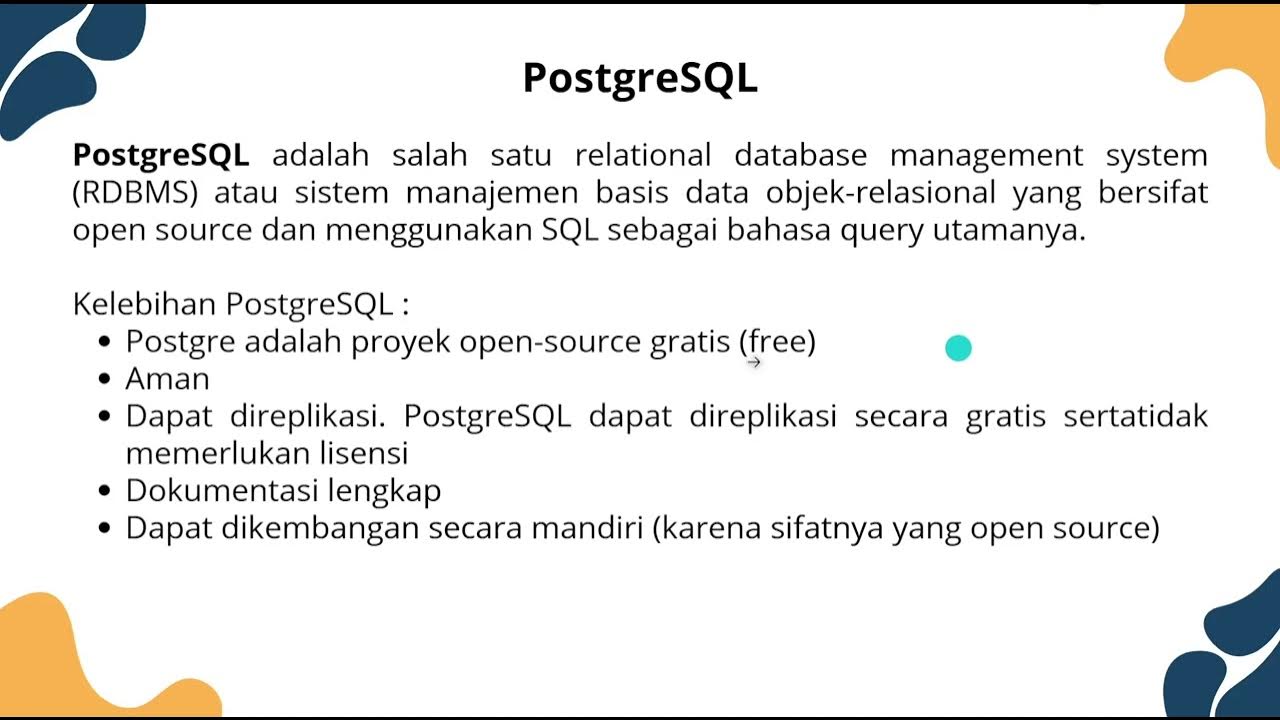SQL vs. NoSQL Explained (in 4 Minutes)
Summary
TLDRThis video explains how to choose the right database in a system design interview, comparing SQL and NoSQL databases. SQL databases are structured, relational, and ACID-compliant, making them ideal for organized, structured data and complex relationships, but they struggle with scalability. On the other hand, NoSQL databases offer flexibility, are easier to scale horizontally, and handle unstructured data well, but they come with the trade-off of eventual consistency in distributed systems. The video highlights the strengths and weaknesses of both types to help guide the choice of database based on specific use cases in interviews.
Takeaways
- 😀 SQL databases are table-based and require a predefined schema, reducing the potential for errors.
- 😀 NoSQL databases are more flexible, supporting document, key-value, graph, and wide-column store models.
- 😀 SQL databases are vertically scalable, while NoSQL databases are horizontally scalable.
- 😀 SQL databases are ideal for relational data, allowing easy querying of relationships between tables.
- 😀 SQL databases are ACID-compliant, ensuring transactions are Atomic, Consistent, Isolated, and Durable.
- 😀 SQL databases require more time to set up because tables and columns need to be predefined.
- 😀 SQL databases are not efficient for storing and querying unstructured data.
- 😀 NoSQL databases are better suited for unstructured data and can scale horizontally more easily.
- 😀 NoSQL databases support distributed data stores and can handle large data volumes with lower cost compared to vertical scaling.
- 😀 NoSQL databases may experience eventual consistency due to delays in replicating data across distributed systems.
- 😀 The trade-off of horizontal scaling in NoSQL databases is a loss of strong consistency in some distributed setups.
Q & A
What are the main differences between SQL and NoSQL databases?
-SQL databases are relational, table-based, and require structured data. NoSQL databases are non-relational and can store unstructured data in formats like key-value pairs, documents, graphs, or wide-column stores.
What does 'ACID compliance' mean in SQL databases?
-ACID compliance refers to the properties of SQL database transactions: Atomicity (all-or-nothing execution), Consistency (data remains valid), Isolation (transactions don't interfere), and Durability (changes are permanent once committed).
Why is SQL not ideal for storing unstructured data?
-SQL databases require a predefined schema for data storage, making them less flexible for storing unstructured data where the format is not defined beforehand.
What are the strengths of SQL databases?
-SQL databases excel at managing structured data with relationships between multiple tables, they ensure data integrity, and are ACID compliant, providing strong guarantees around transactions.
What is meant by horizontal scalability in NoSQL databases?
-Horizontal scalability in NoSQL databases refers to the ability to add more servers to a system to distribute the load, which makes it easier to scale out for handling large volumes of data and traffic.
What is the main weakness of SQL databases when it comes to scaling?
-SQL databases are difficult to scale horizontally due to their relational nature. They typically require vertical scaling (upgrading the existing server) rather than adding more servers, which can be expensive.
What does eventual consistency mean in the context of NoSQL databases?
-Eventual consistency means that after a write operation on a NoSQL database, there may be a delay in propagating the update to all replicas, leading to the possibility of reading stale data until the update is fully synchronized.
Why are NoSQL databases more suited for write-heavy systems?
-NoSQL databases are designed for distributed systems and support horizontal scaling, making it easier to distribute write operations across multiple nodes, thus supporting write-heavy workloads more efficiently.
What makes SQL databases suitable for relational data?
-SQL databases are built around relational models, which makes them ideal for use cases where data is naturally organized in tables with relationships between them, allowing for easy querying and data manipulation across multiple tables.
Can a NoSQL database achieve strong consistency?
-A NoSQL database can be strongly consistent if it's configured as a single-shard database. However, to take full advantage of horizontal scalability, NoSQL databases are often set up as distributed clusters, which introduces eventual consistency instead.
Outlines

此内容仅限付费用户访问。 请升级后访问。
立即升级Mindmap

此内容仅限付费用户访问。 请升级后访问。
立即升级Keywords

此内容仅限付费用户访问。 请升级后访问。
立即升级Highlights

此内容仅限付费用户访问。 请升级后访问。
立即升级Transcripts

此内容仅限付费用户访问。 请升级后访问。
立即升级5.0 / 5 (0 votes)






